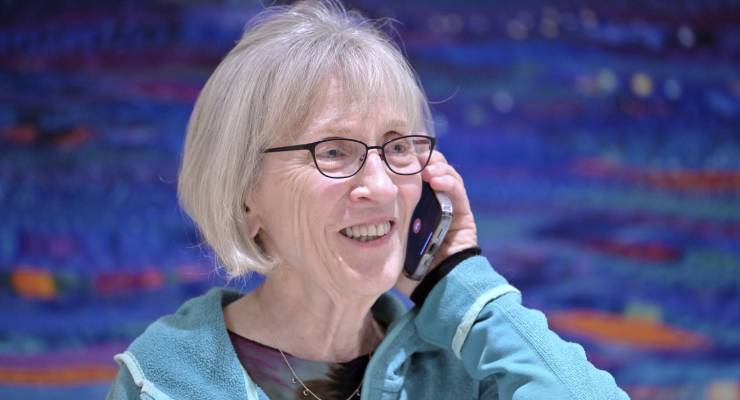
Claudia Goldin has won the 2023 Nobel prize in economics. She is only the third woman in the history of the prize to win it, and she’s the first to win it in her own right, not sharing it with a man. Goldin, a professor at Harvard University, was recognised for her work looking at the gender pay gap and advancing our understanding of women’s labour market outcomes.
On the back of a pandemic that sparked a so-called she-cession, thereby reinvigorating the conversation around gender equality, the fragile foundations of most women’s working lives, and the profound economic insecurity that flows from that, the Nobel committee’s decision to award the top economics prize to Goldin was, indeed, timely.
It was also an acknowledgement of how our understanding of economics — what constitutes “the productive economy” and what we value (and what we don’t… Hint: women’s unpaid and low-paid labour) — has been transformed by pioneering women economists such as Goldin and by recent events, which have certainly focused our collective minds on these issues in a way not seen for generations.
As leading Australian economist Leonora Risse wrote in The Conversation, awarding the top economics prize to Goldin is a “validation” — and I would say a vindication — of her style of research, which clearly showed “that gender gaps in economic outcomes can’t be merely attributed to women’s ‘choices’ or ‘preferences’.”
Cue fist pumping from yours truly!
For veterans like me of the “gender pay gap is down to women’s choices” wars, which rolls round every year like Groundhog Day when the Workplace Gender Equality Agency publishes the annual gender pay gap statistics, Goldin’s work was invaluable. It provided irrefutable evidence to combat the “choices” furphy, instead focusing attention on the structural drivers of the gender pay gap.
But I can’t write about the significance of Goldin’s win without also paying tribute to Australia’s pioneering women in economics, who have likewise transformed the debate here in the six short years since a group of them, including Danielle Wood, the former chief executive of the Grattan Institute who was recently appointed the first woman to head the Productivity Commission, established the hugely influential Women in Economics Network (WEN).
Remember the pushback against that now-infamous 2020 “hard-hat”/ “blokecovery” budget delivered at the height of a pandemic-induced crisis that was disproportionately affecting women? That was spearheaded by members of WEN. The absolutely transformative way we now talk about “infrastructure”, including childcare as fundamental “social infrastructure”. That also has key WEN members’ fingerprints all over it. The push to tackle the undervaluing of women’s work in female-dominated professions, such as aged care and early years education and care, an undervaluing that has led to an irrefutable care crisis? Also WEN.
Through events such as the annual Australian Gender Economics Workshop, a partnership with the National Press Club that saw an annual event dedicated to women economists’ analysis of the budget, to a partnership with the ABC’s 50/50 project that led to a greater share of female economists’ voices on the national broadcaster, WEN has had a profound impact.
A not so fun fact: a bit of research from the early days of WEN indicated that Deloitte economist Chris Richardson had more quotes in the media than the top female economists cited in the media combined. As Wood commented at a recent event celebrating five years of WEN: “It was incredibly skewed to a few voices.”
The Albanese government’s Women’s Economic Equality Taskforce will shortly deliver its final report, and I don’t think it’s hyperbole to credit many members of WEN for helping to lay the groundwork for what its chair, Sam Mostyn, has promised will be a transformative moment for women in Australia.
Founding members of WEN, including Wood, Risse and Angela Jackson, the lead economist at Impact Economics, certainly hugely influenced my recent Crikey Read, Leaning Out: A Fairer Future for Women at Work in Australia. I had each and every one of them on speed dial throughout the pandemic, and I know I’m not alone.
By the time Wood took to the stage late last year at the Labor government’s jobs and skills summit to proclaim “that if untapped women’s workforce participation was a massive ore deposit, we would have governments lining up to give tax concessions to get it out of the ground” (an appearance that prompted The Australian Financial Review to proclaim “an economist emerges as the summit’s early star”), WEN — and its members — had spent years building a bridge to that moment.
Yes, I am an unapologetic female economist mega-fan. Thank you all for your service. If I had to choose between a ticket to Taylor Swift’s Eras tour and the gender economics conference, I would be genuinely torn. I hope, by now, it’s pretty clear why.








It’s also important to acknowledge the earlier & vital contributions of pioneering NZ economist Dame Marilyn Waring in this field. Her groundbreaking 1988 book ‘If Women Counted’ is a must-read. https://en.m.wikipedia.org/wiki/Marilyn_Waring
… finally even the Nobel jury pays homage.
Um no. It is The Sveriges Riksbank Prize in Economic Sciences in Memory of Alfred Nobel…
I agree that Goldin’s work is great and the award was well deserved. But it is not a prize awarded from Alfred Nobel’s 1895 bequest.
A fatuous distinction
Hardly, Alistair. The Sveriges Riksbank Prize in Economic Sciences in Memory of Alfred Nobel only dates from 1968 and was invented as a publicity stunt for the bank. The family of Alfred Nobel fought for years to have it clarified that it was not a genuine Nobel prize. There is a good reason why it is the last Nobel to be announced each year, and in the week following the genuine prizes. At least one physics laureate refused to appear on any stage with a person claiming to be a holder of a “Nobel Prize” in economics.
Compare the lists of winners in the various categories: you will note the economics “prize” is top heavy with Americans from a handful of universities, notably Chicago. Then go to the official Nobel website and compare the summaries of the qualifying work for the various prizes. Be amazed at the earth shattering discoveries in chemistry, physics, medicine, etc. – by very clever men and women from many nations and institutions. Economics stands out for mostly trivial “discoveries” of the bleeding obvious.
True dat…. Ahhh… Wikipedia, you are golden! https://en.wikipedia.org/wiki/Sveriges_Riksbank
4th oldest bank. Hats off for the most trivial reference (economics). Perhaps someone would like to analyse in the context of 42.
bleeding obvious? Only until you hit menopause…
Lets assume our Economics prize is a Nobel prize. From our assumption follows our conclusion that ours is a Nobel prize. Works every time. Or as Milton Friedman would have said, it is “as if” our prize was a Nobel prize. We could build some complex models that demonstrate the same thing even more conclusively using maths that nobody would understand..
The difference between this prize and the actual Nobel Prizes is that the others have a connection to Alfred Nobel (i.e. he established and initially funded five prizes for various sciences, literature and peace). This one doesn’t. It was just named after him for marketing purposes.
That’s a rather large distinction I would have thought.
Look out!.. There are frequent posters on here who will refer to you as General Pedantic simply for seeking accuracy in reporting.
Thanks. I do think it is important to be accurate – and sometimes pedantic too. I shout at the tv daily over the usage of fewer and less, amount and number.
Economists had to invent their own prize as a way to pretend they are credible.
That said, having a look at this woman’s research was enlightening. It would make economists more credible if more of them were like her.